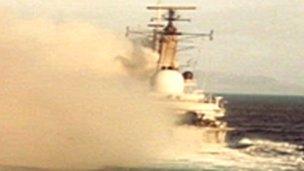HMS Coventry sinking remembered on 30th anniversary
- Published
Underwater footage shows HMS Coventry in her final resting place
It brought down more aircraft than any other ship during the Falklands War, but HMS Coventry would ultimately prove to be a pawn in the conflict's end game.
On the afternoon of 25 May, 1982, three bombs from Argentine aircraft hit the ship, with two of them exploding.
Twenty minutes after impact, the Type 42 destroyer had sunk.
Nineteen lives were lost, but thanks to the brave efforts of the crew on board and those from nearby vessel HMS Broadsword, 280 people were saved.
That fateful day 30 years ago was also Argentina's National Day and the attack came in the wake of the sinking of the General Belgrano and HMS Sheffield.
'Game of chess'
Portsmouth-based HMS Coventry and HMS Broadsword from Plymouth were part of a wider strategy to lure enemy bombers away from British troops landing in San Carlos Bay.
They would act as the first line of defence and, in effect, be "an early warning system".

Captain Hart Dyke: "We were the sacrifice"
In an interview for BBC Two documentary Sea Of Fire, aired on the 25th anniversary of the disaster, HMS Coventry's captain said he knew it would be a suicide mission for his vessel and crew.
David Hart Dyke said: "It's like a game of chess. You've got to give up some pieces to get checkmate in the end. I was one of those pieces.
"I realised why we were doing it. If necessary, we were the sacrifice rather than other ships which were more important with large numbers of troops and more equipment on board.
"And that's war. You've got to take risks to win."
Captain Hart Dyke's fears were soon realised when two pairs of Argentine A-4 Skyhawks engaged both HMS Coventry and HMS Broadsword.
Unexploded bomb
Two bombs hit HMS Coventry, exploding deep down in the ship, but a third failed to detonate.
Richard Kosior and Paul Robson, both from Weymouth, Dorset, were aircraft engineers on HMS Broadsword and HMS Coventry respectively.
The pair witnessed the attack at first hand.

HMS Coventry sunk in the space of 20 minutes
Another bomb struck HMS Broadsword as the attack continued. While it failed to explode, it still caused chaos.
Mr Kosior recalled: "It hit the sea, came through the side of our ship, decided to go through the laundry, came up through the flight deck and snapped the front of the Lynx helicopter on deck right off.
"Exploding bombs are one thing, but bombs that do not go off, but go through the ship do an awful lot of damage.
"It was lucky it didn't explode, as we wouldn't have been able to pick up any Coventry survivors."
The damage to nearby HMS Coventry was much more severe.
'Nowhere to run'
Mr Robson, a leading air engineering mechanic, was on the flight deck manning light machine guns when three bombs struck the ship.
He said: "The aircraft came in very low and very fast, you could see the pilots inside they were that close to us.
"The power of the explosion just ripped the inside of the ship apart.
"There was absolutely no way damage control could have saved the ship, there were three big holes in the port side on the waterline."

Paul Robson was among the 280 survivors of HMS Coventry
Immediately after the bombs went off the ship started to heel to port.
While Mr Robson and his colleagues tried to launch the liferafts, the ship went down in 20 minutes.
He added: "If you're on a ship, you know there's nowhere to run to.
"All you can do is get on and do the job in the situation. The only thing to do was help evacuate people who had been hurt."
Mr Robson eventually stepped off the flight deck and into the icy cold South Atlantic waters.
Around 45 minutes later, he was fortunate enough to be picked up by a Sea King helicopter.
Both Mr Kosior and Mr Robson are now neighbours in the Lanehouse area of Weymouth just as they were neighbours 30 years ago in Falkland Sound when their vessels were in close attendance.
- Published25 May 2012
- Published21 May 2011